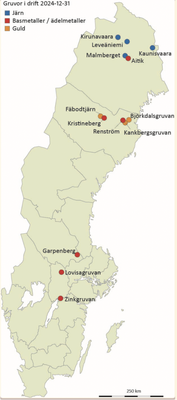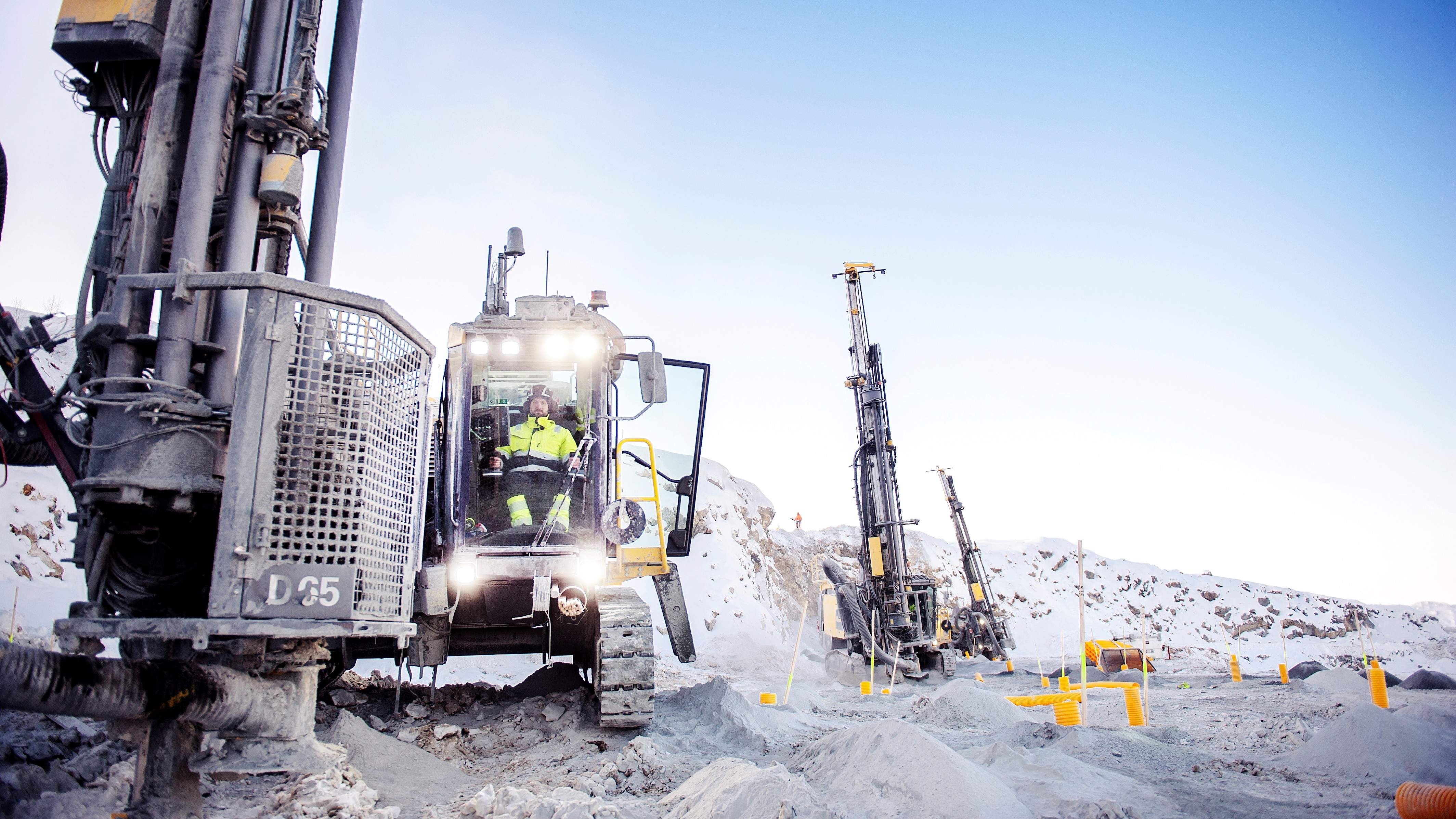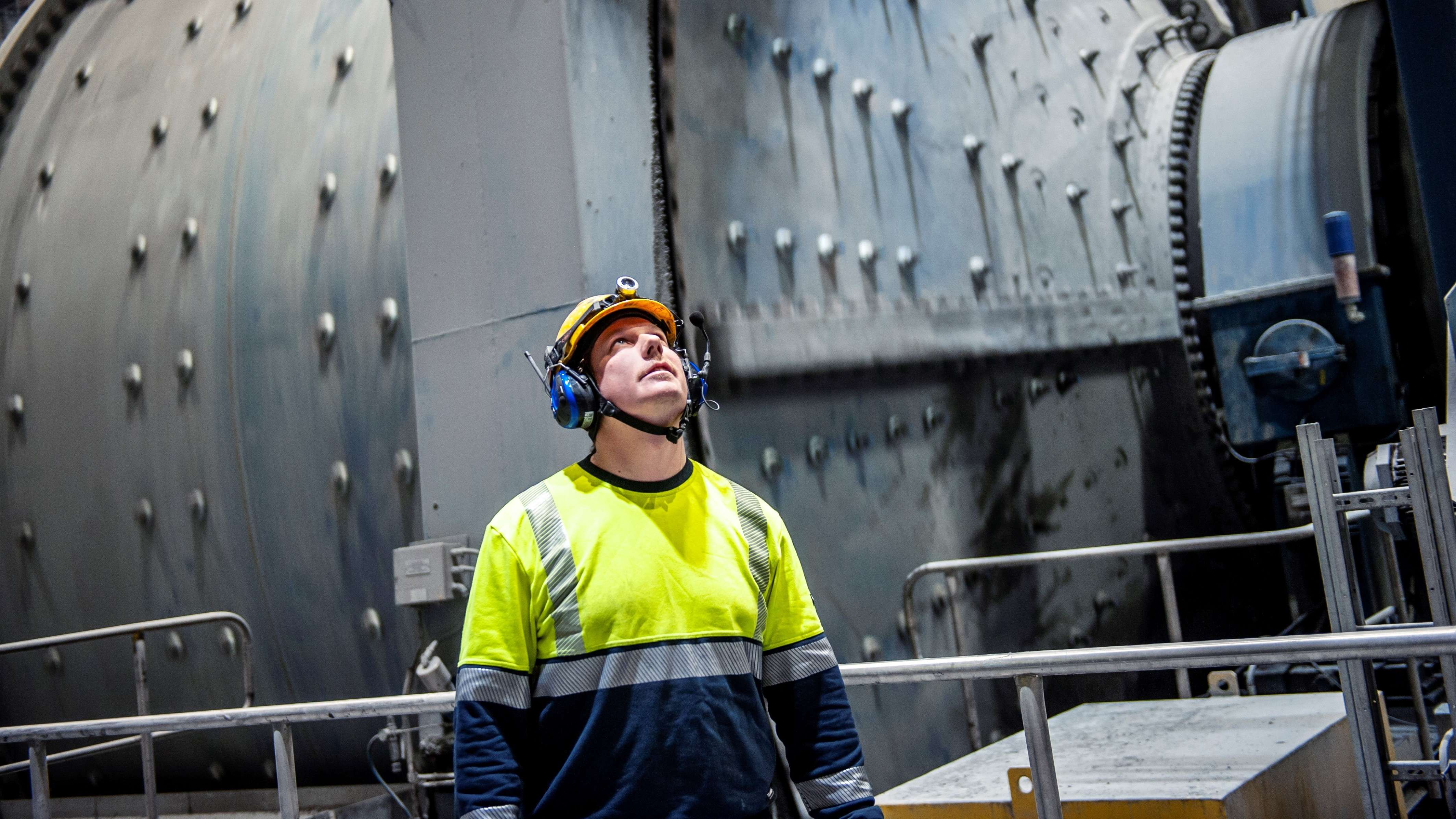Rich in iron ore, poor in inhabitants
In Pajala in Northern Sweden, the local authority is grateful for the mine but also struggles to maintain and recruit workers.
It is no exaggeration to say that Sweden is a major iron ore producer. In 2023, the country was responsible for 93 per cent of EU iron production.
That year, the Swedish mining industry’s turnover was nearly 65 billion Swedish kronor (€5.9bn). Iron ore is used to produce steel, which has a wide range of applications.
 The mining activities are controversial. When mining companies apply for permits for new or continued extraction, the decisions are appealed by Sami representatives and environmental and human rights organisations, among others.
The mining activities are controversial. When mining companies apply for permits for new or continued extraction, the decisions are appealed by Sami representatives and environmental and human rights organisations, among others.
This story takes a look at the labour market aspects, using the mining community of Pajala as an example.
High dependency burden with consequences
“Everyone working in health and social care within the social services department has had their unsocial working hours allowance doubled as of January this year.
“That means everyone working evenings, weekends and nights gets around 12,000 Swedish kronor (€1,100) more a month before tax,” Carin Johansson, head of social services in Pajala municipality tells the Nordic Labour Journal.
This measure was introduced to try to keep and recruit assistant nurses in particular, who are in short supply in the municipality.
Pajala is not alone in facing the challenge of a high dependency burden with a declining population – the same goes for many Swedish municipalities. But in this instance, it is extreme.
The municipality is top of Statistics Sweden’s list measuring the "demographic dependency ratio from the elderly” – which indicates the number of people of pensionable age (65+) in relation to the working-age population (20 to 64 years).
In 2023, at the time of the latest measurement, the municipality’s dependency quota was 124.
“We notice this quite clearly,” says Carin Johansson.
“Around one year ago, we had around 150 home care cases. Now we have around 270. That’s not counting users who just have a safety alarm or get food delivered,” says Johansson.
While Sweden’s population is growing overall, it has been falling in Pajala since 1970. The current population is now below 6,000.
“Many of those who still live here are older people in need of care and support. We have 96 spaces in our care homes, which require a significant number of staff to provide around-the-clock care.”
Home services and care homes are staffed by assistant nurses and care assistants. The current number of workers from these professions is just under 200, which is not enough. The municipality depends on staffing agencies to cover the need, explains Carin Johansson.
“In the winter months, we need to hire between 15 and 20 assistant nurses a month. In the summer, we need many more to allow permanent staff to take their holidays. We then hire nearly 30 assistant nurses every month using staffing agencies.”
The municipality’s geography also means long journeys for home care workers. There are 80 different towns across an area of around 8,000 square kilometres that the municipality covers.
“Sometimes staff must drive nearly 150 kilometres to get home to a client.”
Carin Johansson has not seen any direct competition for staff between the mining industry and the care sector.

Kaunis Iron AB is the company that extracts iron ore in Pajala Municipality. Photo: Kaunis Iron
“The mining industry and its subcontractors benefit the municipality. If we didn’t have a mine, the municipality would empty of people. But of course, the competition is fierce. We cannot match their salaries.
“Our starting pay for a care assistant is 23,000 kronor (€2,100) and an assistant nurse gets just over 24,000 (€2,200). There is also a big difference between working with people and working with machines,” she says.
The mine is an engine
Pajala’s business developer Robert Hawkins is also positive to the mine when the Nordic Labour Journal meets him.
“The mine is the engine in Pajala’s business community. It attracts businesses that would otherwise never move here – a niche industry like blasting for instance.
“Companies outside of the mining sector can now hire them locally instead of looking beyond the municipal borders. Another example is infrastructure, where road construction is happening thanks to the mine.”
Robert Hawkins also mentions the grocery stores, which are a direct consequence of the mining operations.
“They are to be found scattered around the municipality because we live so spread out. But they are still profitable because many who live outside of the municipality commute through here and stop to buy food.
“These shops mean many choose not to move or to do a weekly commute,” he says.
Since 2018, the total turnover for Pajala’s businesses has increased, according to Robert Hawkins. Last year was an exception when Pajala experienced a dip.
“It could be the global situation or because several of our businesses have made big investments here in property and large, expensive machines like wheel loaders, tractors and trucks, which might reduce profit margins,” he says.
Only 64 people were registered as unemployed in Pajala in February 2025, according to the Swedish Public Employment Service. That is a luxury problem, believes Robert Hawkins who has no complaints about the mining industry, which he believes has a good dialogue with the municipality.
“Instead, we should look for a solution that makes it attractive to settle down in the municipality. And some of the corporate tax should go to the municipality as well. That is not the case today,” he says.
In Sweden, the municipality where people work does not receive any of the municipal income tax. It goes to the municipality where the person is a registered resident, in accordance with the Income Tax Act.
Several different professions in mining
Kaunis Iron AB is the company that extracts iron ore in Pajala municipality. Their customers are mainly in China, but some are in Europe and the Middle East. The company has around 400 staff in Pajala municipality, says Lars Bogren, their head of HR.
“Around 70 per cent of those who work with us live locally and can commute daily from their home to their work in Kaunisvaara or Junosuando in Pajala municipality.

Lars Bogren, head of HR at Kaunis Iron AB.
“The others are people like myself, who live in Luleå or some other municipality in North Bothnia Province, and who spend parts of the week in Pajala or elsewhere in the municipality. Very few of our temporary staff live outside of North Bothnia.”
The mining sector employs people across a wide variety of professions. There are miners, process operators, truck drivers and mechanics. In line with the IF Metall trade union agreement, the starting salary is 36,801 Swedish kronor (€3,360) and for truck drivers without experience, it is 30,163 Swedish kronor (€2,760).
Within the service sector, there are positions such as finance, laboratory technicians, environmental coordinators, geologists, and engineers. The starting salary varies depending on their role and previous experience, explains Lars Bogren.
A wait-and-see situation
Kaunis Iron does not currently see a great need to recruit. On 3 April, a ruling from the Land and Environmental Court of Appeal will be announced.
It concerns an application from the company from 2018 for the expansion of mining activities in Tapuli, Sahavaara and Palotieva, along with related activities at the processing plant in Kaunisvaara in Pajala municipality.
“We expect a positive decision. How this will impact our recruitment needs remains to be seen. The global situation with relatively low iron ore prices and a weak dollar has had a negative impact on our profitability, and means we are very careful about expanding our workforce,” says Lars Bogren.
The Public Employment Service's perspective
“There’s a constant and significant labour shortage in Pajala and it will remain so,” Per-Anders Ruona, section head at the Swedish Public Employment Service in North Bothnia tells the Nordic Labour Journal.
He points to Pajala’s demographic development as well as external investments in the municipality, which have created jobs in labour-intensive industries.
“This creates good working conditions but it is also getting harder for the public sector to compete. A lot of teachers and nurses are now working in the North Bothnia mining industry. That’s where we are. And with falling population figures we cannot fill the vacancies with local labour.”
Fresh figures
The national unemployment rate stands at 7.2 per cent according to the latest figures from the Public Employment Service. In North Bothnia, where the ore fields are, the figure is 4.1 per cent.
In some regions, including Skåne in the very south, the rate is 9.5. In Pajala it is 4.0 which equates to 90 - 100 people, says Per-Anders Ruona.
“There is a constant turnover of unemployed people here in North Bothnia. When some projects end, people sign up and a lot of them get a new job within 90 days. Businesses recruit from each other, in many ways.”

The workforce at Kaunis Iron AB consists of a wide range of professional groups. Photo: Kaunis Iron
Job seekers who lack the skills needed in the labour market are supported by the Public Employment Service to better meet employers' demands. However, among the unemployed, there are also older individuals.
“Recent and upcoming retirees represent the biggest challenge. There are recruitment challenges within any profession you can think of, because the numbers in Pajala municipality simply aren’t there,” he says, and makes a link to the Swedish economy.
“What happens in North Bothnia has a big impact on Swedish export revenues.”
Per-Anders Ruona believes that a rapid influx of new residents is necessary to reduce the labour shortage in the mining municipalities.
"As it stands, a large portion of the workforce in North Bothnia is not officially registered here. Many come from Finland and other parts of Europe as guest workers, living in temporary housing.
“We also have what is known as fly-in & fly-out, but in the long run, we need people to live in the communities where they work. We must focus on permanence to create a sustainable society.”
Finland is next
So what are Pajala municipality’s plans for recruiting more staff to the health and care sector?
“We already have some Finnish staff. There used to be more but when the Swedish krona lost its value to the euro, they returned to Finland. Now that the krona has strengthened and we have doubled the unsocial hours allowance, we will launch a recruitment campaign in Finland. We have also been talking about how to reach people in Southern Sweden,” says Carin Johansson.
- 13 mines
-
Sweden has a more than 1,000 year history of iron ore mining and metal processing. Photo: SGU
- A municipality in a crisis
-
Pajala’s economy is in serious trouble, according to a story in Dagens Samhälle:
"The municipality has borrowed millions just to maintain operations. But the crisis is not limited to finances. Last autumn, the municipality turned to SKR’s experts in governance and management for help regarding cooperation between the political leadership and the administrations. Twelve municipal managers have resigned since the beginning of 2024, and the major municipal trade unions have jointly issued a statement warning of a crisis of confidence between the administrative leadership and politicians."
"The trust between politicians and civil servants in crisis-hit Pajala has hit rock bottom, according to SKR’s investigation. The municipality has once again appealed to SKR for help in resolving the situation. SKR’s expert describes Pajala’s situation as the worst since Haninge’s financial collapse in the 1990s."
- Municipal Sweden
-
- There are 290 municipalities in Sweden.
- Stockholm is the largest with 955,574 citizens (2024).
- Dorotea is the smallest with 2,294 citizens (2024).
 Follow us on Facebook
Follow us on Facebook
